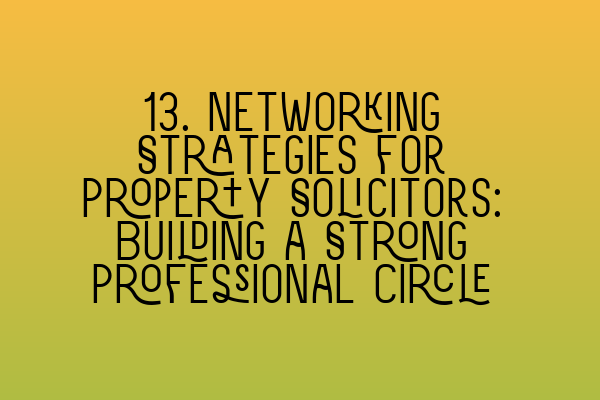Networking is a crucial aspect of building a successful career as a property solicitor. It allows you to expand your professional circle, establish valuable connections, and gain insights into the industry. In this blog post, we will explore 13 effective networking strategies that can help property solicitors build a strong professional circle. So, let’s dive in!
1. Attend Industry Events:
Attending industry events such as conferences, seminars, and workshops provides excellent networking opportunities. These events bring together professionals from various backgrounds, allowing you to connect with potential clients, colleagues, and industry experts. Make sure to come prepared with business cards and engage in meaningful conversations to make a lasting impression.
2. Join Professional Associations:
Joining professional associations related to property law can greatly enhance your networking possibilities. Associations like the Law Society and the Property Lawyers Association provide platforms to meet and connect with fellow solicitors, attend networking events, and gain industry-specific knowledge. Being an active member in these associations can also boost your professional reputation.
3. Utilize Social Media:
In today’s digital age, social media platforms are powerful tools for networking. Create a professional profile on platforms like LinkedIn and connect with individuals in the property industry. Join relevant groups and participate in discussions to demonstrate your expertise. Engage with other professionals by commenting, sharing relevant articles, and reaching out to make meaningful connections.
4. Collaborate with Other Professionals:
Collaboration with professionals in related fields such as real estate agents, surveyors, and mortgage brokers can open doors to new networking opportunities. Establishing mutually beneficial relationships can lead to referrals and expand your reach within the property industry. Attend joint networking events or host collaborative webinars to showcase your expertise and build connections.
5. Offer Pro Bono Services:
Offering pro bono services not only helps those in need but also allows you to demonstrate your skills to potential clients and colleagues. This can lead to valuable networking opportunities, as satisfied pro bono clients may recommend you to others or refer business your way. Additionally, volunteering for legal clinics or community organizations can help you meet like-minded professionals and expand your network.
6. Engage in Online Forums and Discussion Boards:
Active participation in online forums and discussion boards dedicated to property law can help you build a reputation as an expert in the field. Answering questions, providing valuable insights, and connecting with other professionals can boost your visibility and attract networking opportunities. Remember to post informative content and engage in respectful discussions to establish yourself as a credible authority.
7. Attend Local Business Networking Events:
Exploring networking opportunities beyond the legal industry can be highly beneficial. Attend local business networking events to connect with business owners, entrepreneurs, and potential clients. Building relationships outside your immediate field can provide a unique perspective and open doors to unexpected opportunities. Remember to bring your business cards and be ready to introduce yourself and your expertise.
8. Write Guest Blog Posts:
Writing guest blog posts for relevant websites or publications can significantly enhance your networking efforts. By sharing your knowledge and insights, you can establish yourself as an authoritative voice in the property law industry. Be sure to include a short bio and a link to your website or LinkedIn profile to facilitate connections with readers who may want to reach out.
9. Host Webinars or Workshops:
Consider hosting webinars or workshops on topics related to property law. This not only showcases your expertise but also attracts professionals who are interested in learning from you. Promote your events on social media, industry forums, and through your professional network. Hosting such events allows you to connect with attendees, answer their questions, and potentially gain new clients or referrals.
10. Follow Up After Networking Events:
Networking events are only the first step in building meaningful connections. To solidify those connections, make sure to follow up with the individuals you meet. Send a personalized email or connect on LinkedIn to express your pleasure in meeting them. This can lead to further discussions and potential collaborations in the future.
11. Become a Thought Leader:
Establish yourself as a thought leader in property law by regularly sharing informative and engaging content. Write articles for legal publications, contribute to industry-specific websites, or start your own blog. Sharing your expertise and opinions on current issues can attract professionals who resonate with your ideas, leading to valuable networking opportunities.
12. Seek Mentorship:
Finding a mentor in the property law industry can provide invaluable guidance and open doors to networking possibilities. A mentor can connect you with their professional network, introduce you to key individuals, and offer advice on nurturing your career. Look for experienced solicitors who are willing to invest in your growth and provide guidance along the way.
13. Continuously Learn and Stay Updated:
Stay up-to-date with the latest developments in property law by attending relevant training courses, webinars, and conferences. This not only expands your knowledge but also provides opportunities to connect with industry experts and fellow solicitors. Demonstrating your commitment to continuous learning can enhance your professional reputation and attract networking opportunities.
In conclusion, networking is a vital component of building a strong professional circle as a property solicitor. By following these 13 strategies, you can expand your network, establish valuable connections, and position yourself as a trusted professional in the industry. Remember, building strong relationships takes time and effort, so be patient and persistent in your networking endeavors.
For more information on preparing for the SQE exams, visit our related articles:
– SQE 1 Practice Exam Questions
– SQE 1 Practice Mocks FLK1 FLK2
– SQE 2 Preparation Courses
– SQE 1 Preparation Courses
– SRA SQE Exam Dates
